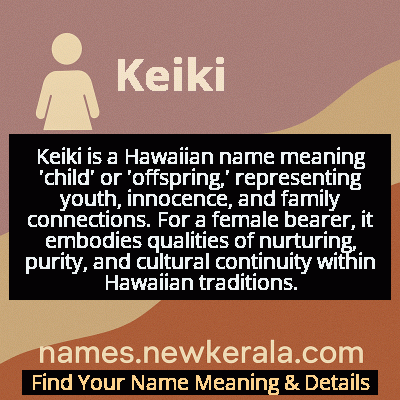Keiki Name Meaning & Details
Origin, Popularity, Numerology Analysis & Name Meaning of Keiki
Discover the origin, meaning, and cultural significance of the name KEIKI. Delve into its historical roots and explore the lasting impact it has had on communities and traditions.
Name
Keiki
Gender
Female
Origin
Hawaiian
Lucky Number
9
Meaning of the Name - Keiki
Keiki is a Hawaiian name meaning 'child' or 'offspring,' representing youth, innocence, and family connections. For a female bearer, it embodies qualities of nurturing, purity, and cultural continuity within Hawaiian traditions.
Keiki - Complete Numerology Analysis
Your Numerology Number
Based on Pythagorean Numerology System
Ruling Planet
Mars
Positive Nature
Generous, passionate, energetic, and humanitarian.
Negative Traits
Impulsive, impatient, moody, and can be overly emotional.
Lucky Colours
Red, maroon, scarlet.
Lucky Days
Tuesday.
Lucky Stones
Red coral, garnet.
Harmony Numbers
1, 2, 3, 6.
Best Suited Professions
Military, sports, philanthropy, leadership roles.
What People Like About You
Courage, energy, leadership, generosity.
Famous People Named Keiki
Keiki Kanahele
Hawaiian Royalty
Member of Hawaiian royal family, known for preserving cultural traditions
Keiki Akana
Cultural Practitioner
Prominent hula instructor and preserver of Hawaiian dance traditions
Keiki Kawai'ae'a
Educator
Leader in Hawaiian language revitalization and immersion education
Name Variations & International Equivalents
Click on blue names to explore their detailed meanings. Gray names with will be available soon.
Cultural & Historical Significance
The significance of Keiki extends beyond individual families to encompass the entire Hawaiian worldview. In traditional Hawaiian society, children were not merely seen as personal possessions but as community resources who would carry forward the knowledge, skills, and values of their elders. The name therefore represents hope, continuity, and the interconnectedness of past, present, and future generations. This cultural perspective makes Keiki more than just a name - it's a statement about the child's role in the larger social fabric and a reminder of the collective responsibility to raise children who will honor and perpetuate Hawaiian culture.
Extended Personality Analysis
Individuals named Keiki are often perceived as nurturing, compassionate, and family-oriented, reflecting the name's meaning of 'child.' They typically exhibit warm, caring personalities with strong connections to their roots and community. These individuals tend to be protective of those they love and often assume caretaking roles naturally. Their childlike wonder and curiosity can persist into adulthood, making them open-minded, creative, and enthusiastic about learning new things. However, this same quality might sometimes manifest as naivete or vulnerability in challenging situations.
Beyond these surface characteristics, Keiki-named individuals often possess strong emotional intelligence and intuition, allowing them to connect deeply with others while maintaining a sense of innocence and purity in their worldview. They frequently demonstrate resilience and adaptability, much like children who quickly learn and grow from experiences. There's often a youthful energy about them that can be infectious, and they tend to approach life with optimism and trust. While they may need to develop stronger boundaries as they mature, their fundamental nature remains grounded in the qualities of openness, authenticity, and genuine care for others that the name so beautifully represents.
Modern Usage & Popularity
In contemporary times, Keiki remains a popular name choice in Hawaii and among Hawaiian diaspora communities, though it has also gained some recognition internationally. The name maintains strong cultural resonance while being accessible to non-Hawaiian speakers due to its simple pronunciation and universal meaning. While not among the most common Hawaiian names in mainstream usage, it appears regularly in Hawaii and has seen steady usage over recent decades. The name's popularity reflects ongoing cultural revitalization movements and increased appreciation for indigenous Hawaiian names. It's particularly favored by parents who value the name's direct connection to family, innocence, and cultural heritage. Modern usage also sees Keiki appearing in educational contexts, community organizations, and cultural events focused on children's development and Hawaiian cultural preservation.
Symbolic & Spiritual Meanings
Symbolically, Keiki represents innocence, new beginnings, potential, and the continuity of life. The name carries metaphorical meanings of purity, growth, and the fundamental connection between generations. It symbolizes hope for the future and the importance of nurturing what is young and vulnerable. In a broader sense, Keiki can represent the 'child within' all people - that part of ourselves that remains curious, open to wonder, and capable of growth. The name also symbolizes cultural continuity and the responsibility of each generation to preserve and pass on traditions, knowledge, and values to the next. As a symbolic representation, Keiki embodies the idea that every child carries the potential for cultural renewal and represents the living bridge between ancestral wisdom and future possibilities.

